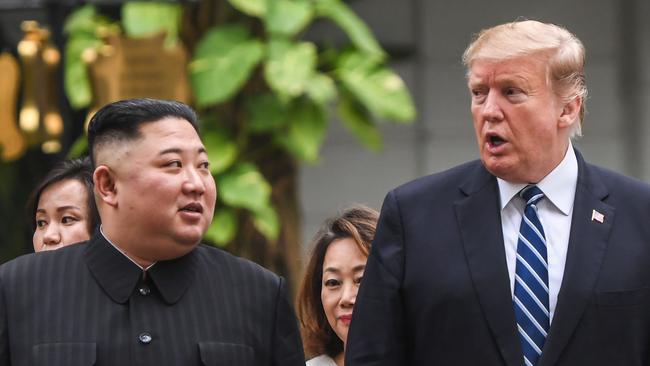Hanoi chaos clashes with drama in DC
Americans had a choice yesterday: they could view Donald Trump as contender for the Nobel Peace Prize or as a criminal conman.

Americans had a choice yesterday: they could view US President Donald Trump as contender for the Nobel Peace Prize for his work with North Korea or see him as a criminal and conman because of how he was portrayed by his former lawyer, Michael Cohen.
Those were the jarring, head-spinning television images that emerged from what will surely be remembered as one of the most memorable days of the Trump presidency. And if ever there was a day that encapsulated the promise, peril and extraordinary nature of that presidency, yesterday was it.
By day’s end, it was less clear whether, beyond the drama and theatre, the ground had actually shifted in a substantive way. The North Korea talks collapsed as legal analysts began debating whether Cohen opened significant new fronts of vulnerability for the President or merely added vivid details to a narrative already generally known.
Moreover, views of Trump are so divided, and so entrenched, that even such a momentous day may leave Americans only more deeply locked into what they already believe about the 45th US president — and increasingly sputtering with rage at those on the other side of the divide.
Of course, Americans have some experience holding conflicting images of their presidents. They watched president Bill Clinton be impeached while he was overseeing a period of sustained peace and prosperity. They saw president Richard Nixon move from a historic opening up of China to a Watergate crisis that led to his resignation.
But rarely have those kinds of contradictions been on such graphic display at the same time.
The day (US time) began with Trump meeting Kim Jong-un, the enigmatic leader of North Korea, for a dinner in Vietnam.
Within a few hours those images were shoved aside by hours of dramatic and equally norm-shattering televised congressional testimony by Cohen.
Speaking under oath, he declared of the President of the US, in a line that figures to be the lasting memory of his testimony: “He is a racist, he is a conman and he is a cheat.”
As that suggests, Cohen’s description of the President’s character was withering.
More substantively, he said the President both directed hush-money payments to two women claiming affairs with him, and continued to personally pay back Cohen for the payment to one of the women, adult-movie actress Stephanie Clifford, while in the White House.
Cohen produced a cheque from the President to prove his contention.
That would mean Trump not only lied about the payments publicly but may have been complicit in a campaign-finance violation by hiding expenditures made to benefit his presidential campaign.
And second, Cohen said the President knew of the pending release of emails stolen from his Democratic opponent, Hillary Clinton, and her camp. That suggests he might have been complicit in the dissemination of stolen goods.
Significantly, though, Cohen also said he had no knowledge of collusion between Trump and Russia, which is the core matter being investigated by special counsel Robert Mueller.
There was another, more political signal as well. One after another, Republicans on the house oversight committee chose not to question the President’s actions but to attack Cohen. They effectively swung behind Trump.
And that suggested that, while Trump sustained a series of blows from a one-time loyalist, his support among House Republicans, at least, remains solid.
The Wall Street Journal


